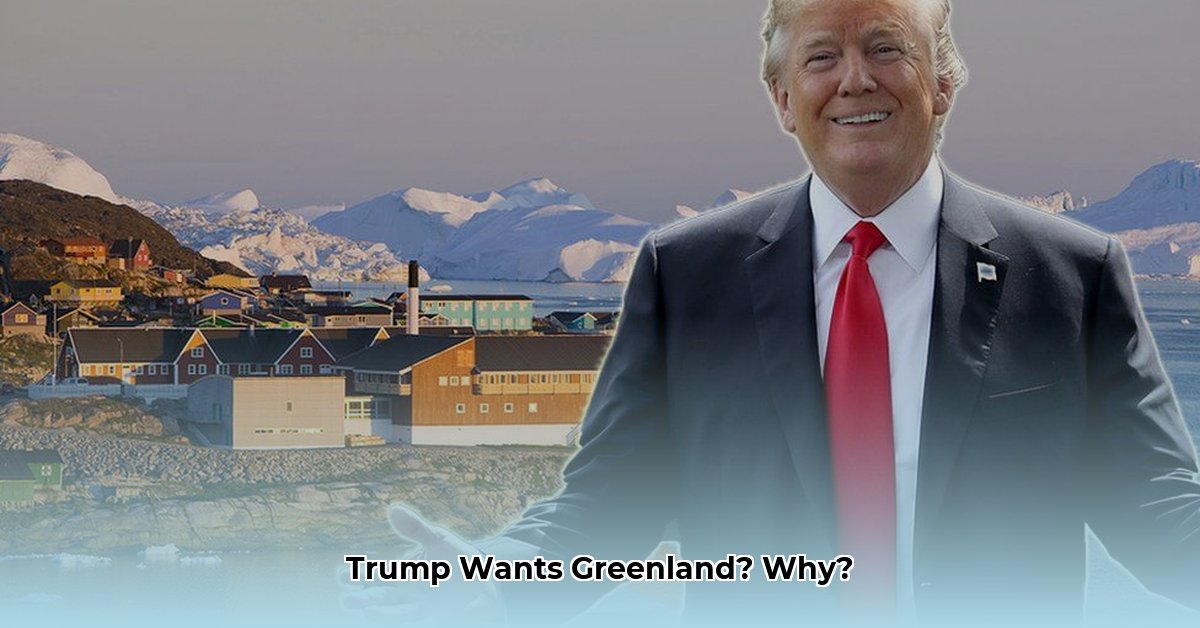The Pursuit of Greenland: A Timeline of Trump’s Arctic Ambitions
Donald Trump’s fascination with Greenland has persisted throughout his political career. Initially surfacing during his first presidency (2017-2021), the idea seemingly faded, only to reemerge following his 2024 re-election. This renewed interest culminated in his son, Donald Trump Jr.’s, visit to Greenland in January 2025. This timeline underscores the enduring nature of this unusual geopolitical saga.
| Date | Event |
|---|---|
| 2019-2020 | Initial expressions of interest in acquiring Greenland |
| Late 2024 | Renewed interest after the 2024 election |
| Jan 2025 | Donald Trump Jr.’s visit to Greenland |
Decoding the Motivation: Why Greenland?
Trump’s persistent interest in Greenland likely stems from a confluence of economic and strategic factors. The island’s vast deposits of rare earth minerals, crucial for modern technologies and defense systems, present an undeniable economic lure. Controlling these resources could potentially disrupt China’s dominance in the rare earth market, a key strategic objective for the United States.
Beyond resources, Greenland’s strategic location in the Arctic enhances its appeal. As climate change melts Arctic ice, new shipping routes and access to untapped resources emerge, transforming the region into a geopolitical hotspot. Greenland, situated at the crossroads of these developments, offers a potential strategic foothold for projecting American power and influence in the increasingly contested Arctic. This aligns with a historical pattern of US interest in the region, dating back to the 19th century. The presence of Thule Air Base (Pituffik), a key US military installation in Greenland, further underscores the strategic significance of the island.
Greenland’s Resolute “No”: The Importance of Self-Determination
Greenland and Denmark have consistently rejected any notion of a sale. Their unwavering stance emphasizes Greenland’s commitment to self-determination and its right to chart its own future. This rejection, however, does not diminish Greenland’s strategic importance but rather underscores the complex political landscape surrounding its future. Greenland’s Premier, Múte Egede, has clearly articulated this position. (Insert any available direct quotes from Premier Egede here).
Global Reactions and Implications: A World Watching
Trump’s pursuit of Greenland has drawn international attention and sparked varied reactions. Denmark, as Greenland’s sovereign nation, has firmly reasserted its control. This situation may introduce strain into the US-Danish relationship. Other Arctic nations, including Canada and Russia, are likely observing developments closely, assessing the potential impact on regional stability and resource competition.
| Region/Country | Likely Reaction | Possible Interpretations |
|---|---|---|
| Denmark | Strong rejection, reaffirming sovereignty over Greenland | Protecting national interests, upholding Greenland’s right to self-determination |
| Greenland | Firm refusal, emphasizing self-determination and partnership, not ownership | Asserting autonomy, prioritizing economic development and international cooperation over being a political bargaining chip |
| European Union | Probably cautious observation, potential concern over Arctic stability | Maintaining diplomatic balance, safeguarding regional interests |
| Russia | Likely skepticism, and viewing it as US expansionism in the Arctic | Geopolitical rivalry, concern over increased US military presence |
| Canada | Probable concern due to shared Arctic interests | Regional stability concerns, potential implications for Canadian Arctic sovereignty |
| China | Likely interest in observing US Arctic strategy, and the potential economic ramifications | Assessing geopolitical shifts, evaluating opportunities for resource partnerships |
| Other Arctic Nations | Likely monitoring developments, and potential impact on existing Arctic agreements and cooperation | Maintaining regional stability, safeguarding environmental concerns |
The Feasibility of a Purchase: Legal and Political Hurdles
Could Greenland actually be bought? The legal and political realities make such a transaction highly improbable. Greenland’s status as a self-governing territory within the Kingdom of Denmark presents a significant legal hurdle. Any potential sale would require navigating complex international treaties and respecting the democratic rights of the Greenlandic people. Furthermore, the sheer economic scale of such a purchase would be astronomical.
The Strategic Calculus: A Deeper Dive
Trump’s interest in Greenland likely extends beyond simple territorial acquisition. It suggests a broader strategic calculation aimed at securing critical resources, potentially limiting Chinese influence, and bolstering US military presence in the Arctic. Some analysts suggest it may be a tactic to gain leverage in other areas of international relations, while others believe it reflects a genuine desire to reshape the geopolitical landscape of the Arctic. The ongoing research and analysis of the motivations and potential outcomes of this complex issue highlight the dynamic and evolving nature of Arctic geopolitics. It’s crucial to remember that our current understanding may continue to evolve with future events.
FAQ: Addressing Key Questions about the Greenland Proposal
Could the US legally buy Greenland? It’s highly unlikely. Greenland’s autonomous status within Denmark creates significant legal and political barriers. Any transfer of sovereignty would involve complex international negotiations and require the consent of both Denmark and the Greenlandic people.
Why is Greenland strategically important? Its location in the Arctic, rich in natural resources, and emerging importance in global shipping routes make it a strategically significant territory.
What are rare earth minerals, and why are they important? Rare earth minerals are a group of 17 elements essential for various modern technologies, including electronics, renewable energy systems, and defense applications. Securing access to these minerals is a strategic priority for many countries.
What is Greenland’s relationship with Denmark? Greenland is a self-governing territory within the Kingdom of Denmark. Denmark retains control over foreign affairs and defense, while Greenland manages its domestic affairs. Greenland has the option to pursue full independence.
What is the impact of climate change on Greenland? Climate change is significantly impacting Greenland, leading to melting ice sheets, rising sea levels, and altered weather patterns. These changes present both challenges and opportunities for Greenland, impacting its environment, economy, and geopolitical significance.







